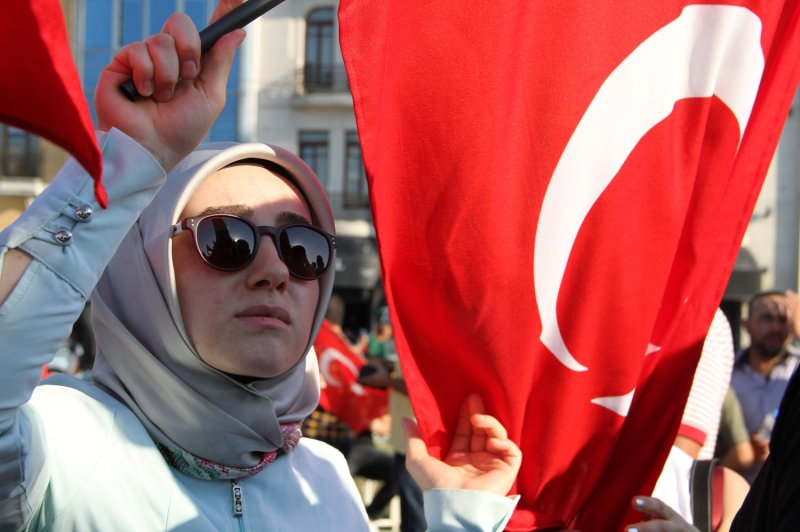A veiled woman holds a Turkish flag during a demonstration in Istanbul in support the government on July 16 following a failed coup attempt. The situation there is just of many thorny dilemmas facing the next American president. Photo by Hanna Noori/ UPI |
License Photo
With the U.S. presidential election exactly three months away, both campaigns are operating at a flank speed. Barack Obama, Hillary Clinton and Tim Kaine are daring Republican supporters to abandon ship.
Many Republicans could be following that advice as long as Donald Trump's incredibly loose lips shoot holes in his campaign ship, possibly costing the GOP both the Senate and House. Meanwhile, the incredibly difficult and often impossible challenges facing a president have been overshadowed as the two most disliked and unpopular candidates in a very long time vie for the job.
Jack Kennedy famously said that there is no school for presidents. Perhaps there should be. However, the nominating processes and campaign are surely not it. Consider how tough the job really is.
First, government is broken. Bitter partisanship equally caused by the movement of both parties toward left and right extremes has destroyed civility and compromise crucial to lubricating the friction of a government of checks and balances. And even when Obama and the Democrats controlled both Houses of Congress in 2009-11, the legislation passed to deal with the financial crises of 2008-09 was only able to stimulate a fragile recovery. The Democrats would lose the House in 2010 and the Senate in 2014.
If a president could not succeed with a Congress his party controlled, what happens when divided and fractured government continues because no single party will win 60 Senate seats needed for a super majority to override filibusters and the House? The answer is clear. The next president and Congress are on a collision course, no matter who wins.
Second, the attempted coup in Turkey, a NATO ally and partner in the fight against terror, has inflamed anti-American sentiment there. In fact, a suit was preposterously filed against two senior U.S. generals alleging responsibility. Turkey is critical in dealing with the conflict in Syria and upward of 300,000 dead; a very dangerous Islamic State; Iraq and Libya that are in chaos; and Russian influence in the region.
To complicate matters, the Turks have demanded the extradition of Fethullah Gulen, a 77-year old "educator" living reclusively in the Pennsylvania Poconos. Gulen, whose global empire includes hundreds of schools and organizations founded in his name, is accused of plotting the coup and other misdeeds against the Turkish government. Gulen and Turkish President Recep Erdogan were once colleagues who are now mortal political enemies.
Whether Gulen is guilty as charged -- and here the memory of the equally ancient cleric Ayatollah Khomeini exiled in France could be relevant -- or as he and his followers claim is a secular "educator" is far from clear. However, extradition will take time as it is the courts that will decide the case. And this case could eventually reach the Supreme Court, meaning a very protracted process.
Hence, as Syria burns, predictably, relations between Ankara and Washington will suffer. With Erdogan visiting Russian President Vladimir Putin, who knows what mischief might come of that. For any American president, what to do is by no means easily answered.
Third, Russia continue to pose a Gordian-like problem. Putin has been at the top of his game. He has intimidated NATO over Ukraine. He has deployed a relatively tiny military force to Syria that saved President Bashar al Assad and dealt decisive if not fatal blows to the opposition. Russian hackers likely intervened in the U.S. presidential elections aided and abetted by Wikileaks in distributing the emails purloined from the Democratic National Committee's servers. So Mr. or Mrs. President-elect, what are your options and plans for Russia?
Last, the Pentagon withheld $300 million in coalition support funding for the Pakistan Army. The reason is the unwillingness of that Army to dismantle the Haqqani network -- declared by the United States a terrorist organization. For years, a love-hate relationship has conflicted the Washington-Islamabad axis. Ironically, no one recalls that when Charlie Wilson was fighting his war against the Soviets in the 1980s in Afghanistan, the Haqqanis were on his side. Today many Pakistanis fear that challenging the powerful Haqqani network will guarantee a blood bath against the government and its elected leaders. So, Mr. President, what do you do?
These and other crises regularly land on the Oval Office desk. While the firestorm over $400 million in non-U.S. currency flown secretly to Tehran as hostages were being released will pass, new crises will flare.
At some stage, Americans must realize how tough this job is and demand of the candidates plans for coping with this harsh reality. Sadly, that too is not likely.
Harlan Ullman is UPI's Arnaud de Borchgrave Distinguished Columnist and serves as senior adviser for Supreme Allied Commander Europe, the Atlantic Council and Business Executives for National Security and chairs two private companies. His last book is "A Handful of Bullets: How the Murder of Archduke Franz Ferdinand Still Menaces the Peace." His next book, due out next year, is "Anatomy of Failure: Why America Loses Wars It Starts."















